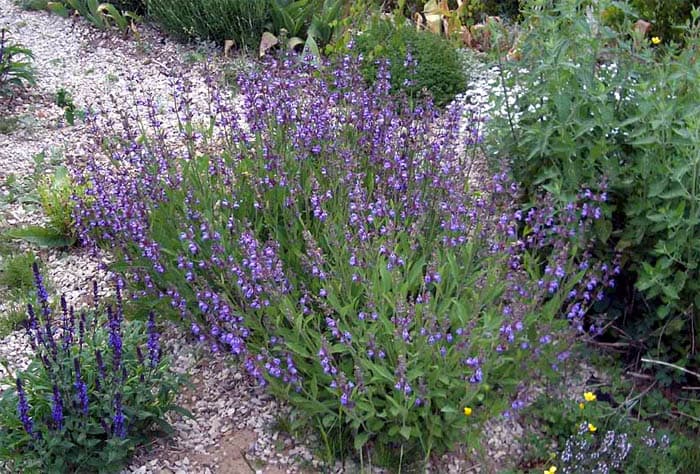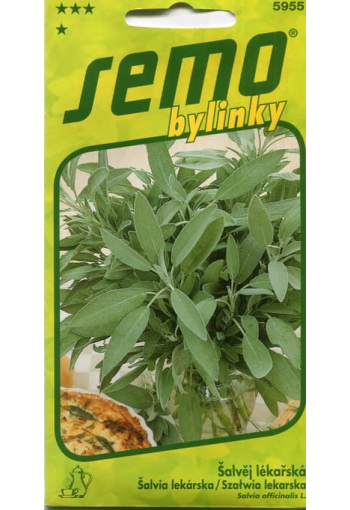Ex Tax: 1.23€
Perennial shrub up to 50 cm tall. Blooms in July-June. Prefers fertile soil, warm place. Heat and frost resistant. Dried leaves are used for medicinal purposes. It is used for bronchitis, colitis, gastritis, liver and kidney diseases. Fresh and dry leaves are used as a seasoning in cooking, in the preparation of canned food, sausages, cheeses and wine. Dried leaves are used for medicinal purposes.
The leaves contain essential oils, tannins, resin, flavonoids, alkaloids, ursolova, oleanic and chlorogenic acids, vitamin P, nicotinic acid, bitterness, uvaol, paradiphenol, gum, starch, protein substances, figocides, which have a strong bactericidal property.
The plant has a calming, disinfectant, expectorant, astringent, hemostatic, anti-inflammatory, choleretic, diuretic effect. Antimicrobial properties are associated with essential oil, anti-inflammatory - with tannins, flavonoid compounds and vitamin P, which thicken epithelial tissues, reduce the permeability of cell membranes, the walls of blood and lymphatic vessels. The antiseptic properties of sage leaves are due to the herbal antibiotic Salvin. Salvin not only delays the reproduction of Staphylococcus aureus, but also inactivates its alpha-toxin, suppresses its hemolytic and dermatonecrotic properties.
Essential oil of sage has antifungal activity. Due to the presence of essential oils, the infusion of sage leaves increases the secretory activity of the gastrointestinal tract, has a slight antispasmodic effect.

Eng.: Common sage, kitchen sage, broadleaf sage, Dalmatian sage. Suom.: Ryytisalvia, rohtosalvia. Sven.: Kryddsalvia. Bot.: Salvia officinalis L.
* For medicinal purposes, use the leaves of medicinal sage.
The leaves contain essential oils, tannins, resin, flavonoids, alkaloids, vitamin P, nicotinic acid, bitterness, gum, starch and proteins.
The plant has a calming, disinfectant, expectorant, astringent, hemostatic, anti-inflammatory, choleretic and diuretic effect, increases the secretory activity of the gastrointestinal tract, and has a slight antispasmodic effect.
An infusion of leaves is used for rinsing with acute tonsillitis and chronic tonsillitis, stomatitis, gingivitis, acute respiratory diseases, aphthous lesions of the oral cavity, cheilitis, in the treatment of pulpitis, for washing festering wounds, ulcers, burns and frostbite.
General and local baths with an infusion of sage leaves are prescribed for eczema, psoriasis, and intertriginous epidermophytosis.
Infusion for rinsing is prepared like tea, often adding 1/2 teaspoon of boric acid to a glass of infusion; you can make a tincture prepared with 70% alcohol (1:10).
Sage is effective for the reduced secretory function of the stomach and duodenum, with excessive accumulation of gases in the gastrointestinal tract, cholecystitis, and hepatitis is used to treat inflammatory diseases of the urinary organs, for mild forms of diabetes, reduces sweating, can be used for some forms of fever, hyperthyroidism, in menopause, with pulmonary tuberculosis.
Sage leaves are used for chronic bronchitis, hypertension, atherosclerosis, trembling paralysis, and night sweats.
The sage leaf is part of a number of gastric and chest emollient collections, the composition of the main collections used to treat pulmonary tuberculosis.
It is prescribed in the form of tea (1 tablespoon of crushed leaves, pour 2 cups of boiling water and leave for 20-30 minutes.
Take 1/4 cup 3-4 times a day with meals).
NB! After a year of storage, sage loses its properties.
Precautions: sage reduces the secretion of milk, so nursing mothers should not use fees or preparations that include this plant as a medicine. Sage should also not be taken in excessive doses for more than 3 months, as it can cause irritation of the mucous membranes. Contraindicated in acute nephritis, as well as in pregnancy.
• 1 teaspoon of crushed leaves per 1 cup of boiling water, leave for 30 minutes, strain.
Take 1-2 tbsp. spoons 3-4 times a day for gastritis, colitis, gastric and duodenal ulcers, and inflammation of the liver, and gallbladder.
• 1 teaspoon of crushed sage leaves per 1 cup of boiling water, leave for 30 minutes, strain.
Take 1/2 cup warm 2-3 times a day for respiratory diseases.











